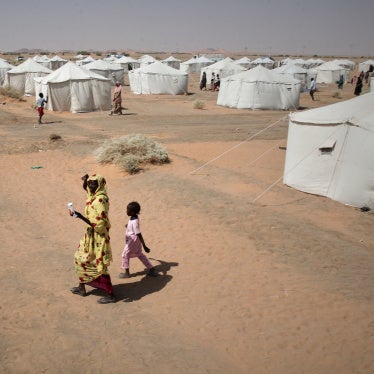(New York) — Thousands of young men and boys, many of whom have committed atrocities while fighting in West Africa’s brutal civil wars, face re-recruitment into the region’s emerging conflicts, Human Rights Watch said in a new report released today. International efforts to disarm these fighters must provide them with alternatives to war.
Côte d’Ivoire and Guinea, two countries marked by growing political instability, are the current theaters into which these young fighters are being drawn, according to Human Rights Watch.
The lives of these “regional warriors” are documented in a 66-page report, “Youth, Poverty and Blood: The Lethal Legacy of West Africa’s Regional Warriors.” Based on interviews with some 60 former fighters who have crossed borders to fight in Liberia, Sierra Leone, Côte d’Ivoire and Guinea, the report explores the forces driving the phenomenon of cross-border mercenary activity in West Africa.
Since the 1980’s, impunity and impoverishment have fueled a pattern of extreme violence in countries such as Liberia, Sierra Leone and Cote d’Ivoire. Time and again, these fighters—most of whom began their military “careers” as children after being forcefully abducted to fight with an armed group—are drawn into the region’s conflicts. Many of these fighters have gone on to commit war crimes and crimes against humanity against civilians. Corrupt and repressive government policies, as well as arms dealers flooding the region with weapons, have given rise to further internal conflict.
“Breaking the cycle of atrocities in West Africa depends on disarming these fighters, demobilizing them, and providing them with alternatives to war,” said Peter Takirambudde, Africa director at Human Rights Watch. “Half-measures ensure that the international community will face new calls for intervention in the region’s conflicts, long after it’s too late to prevent new atrocities.”
In the past year, well over two-thirds of the Liberian ex-combatants interviewed by Human Rights Watch said that they had been asked to join fighting “missions” in Guinea and Côte d’Ivoire. Among those recruited to fight in neighboring Guinea, about half had been approached by commanders claiming to represent a fledgling Guinean insurgency, and the other half by those claiming to be supporters of Guinean President Lansana Conté.
Just last month, a Human Rights Watch mission to Liberia found that hundreds of recently demobilized Liberians, including children, have been re-recruited to fight in Côte d’Ivoire since October. According to those interviewed in southeastern Liberia, they have gone to fight alongside militias associated with the Ivorian government.
These young fighters are victims as well as perpetrators of serious human rights violations, Human Rights Watch said. The report details how after initial recruitment into a warring faction they were submerged into a world of brutality, physical hardship, forced labor and drug abuse. And it shows how they emerged as fighters willing to rape, abduct, mutilate and kill civilians.
All of the combatants interviewed fought with groups that have, to varying degrees, committed serious human rights crimes against civilians, often on a widespread and systematic scale. The fighters interviewed by Human Rights Watch had fought with such groups as the National Patriotic Front of Liberia (NPFL) and Sierra Leone’s Revolutionary United Front (RUF). Although these armed groups were responsible for killing, raping or maiming tens of thousands of civilians, the perpetrators have largely enjoyed impunity for the atrocities committed.
When the youth interviewed were re-recruited into subsequent wars, all were unemployed or living a precarious economic existence, and were motivated by the promise of both financial compensation and the opportunity to loot.
“We thought things would be ok, but they went bad again. There was no food,” said one Liberian combatant, who had fought in wars across West Africa. “I had to feed my parents. The commanders said we could pay ourselves, which meant looting.”
Most interviewed received at least part of the financial compensation offered by the recruiters, and all participated in and benefited from the looting and pillage of civilian property—itself a war crime. Most described using the money to pay rent, school and medical fees for their extended family, and to engage in petty trading.
“The fact that war has become the only economic route for thousands of youth points to serious failings by their countries’ governments,” said Takirambudde.
International efforts to disarm and reintegrate former fighters into their home communities have so far had limited success, Human Rights Watch said. The report identifies problems in the U.N.-led disarmament, demobilization and reintegration programs in Sierra Leone and Liberia. The report details corruption by commanders and disarmament program officials who diverted benefits earmarked for their subordinates to themselves instead.
The young fighters interviewed for the report noted how these programs lack adequate grievance procedures to address corruption. They described how the shortcomings of the demobilization programs have greatly contributed to their decision to take up arms in subsequent conflicts.
The report also notes how a severe funding shortage in the Liberian disarmament program has left some 40,000 combatants at risk of missing out on job training and education, making them more vulnerable for re-recruitment to fight in future armed conflicts.








